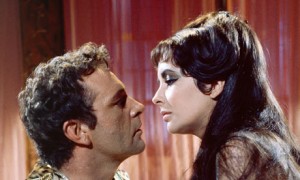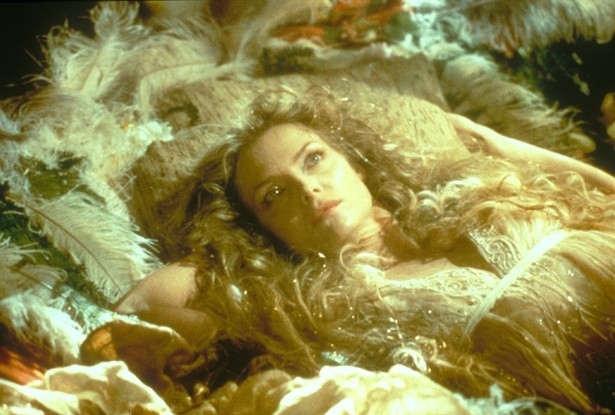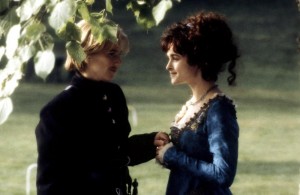It has been debated whether or not William Shakespeare, the actor and playwright from Stratford-upon-Avon, actually wrote the ingenious productions first performed at the Blackfriars Theatre and The Globe, and still considered some of the greatest literary works of all time. While there are a host of conspiracy theories pointing to many of his contemporaries like Edward de Vere, Francis Bacon and Christopher Marlowe as the real creators of his works, some believe the true author may have been a member of the fairer sex—Mary Sidney Herbert or perhaps even Queen Elizabeth I herself.
That two women are among the lot isn’t shocking. After all, if you’ve had the pleasure of reading a bit of the Bard, you’re aware of his penchant for strong-willed females. From gender-bending heroines and formidable queens to unparalleled wits and complex rulers, here are five OGs of Strong Female Characters (SFCs) and why, after more than 400 years, they still stand the test of time.
Viola – Twelfth Night
After surviving a shipwreck that separates her from her twin brother, Viola washes up on the shore of unknown Illyria. Instead of having a full-fledged breakdown, she talks a sea captain into helping her cross-dress as a dude so she can take a job at the nearby Duke Orsino’s court. Not only does this protect her from being taken advantage of, but it allows her to see the world from different perspectives, specifically the lovelorn Duke she’s serving. Through her disguise, she has the freedom to develop a sense of intimacy and friendship with him that she otherwise wouldn’t experience. She can speak freely in his presence and does so with confidence despite her role as a servant. And yet she also never has to sacrifice the feminine attributes that make her empathetic and nurturing to those around her. The duality of Viola’s androgyny allows her to enjoy a special harmony of character and because of this, she remains one of Shakespeare’s most dynamic, complete, and evolved heroines.
Lady Macbeth – Macbeth
You know how they say that behind every strong man is an even stronger woman? Well, the same holds true in “that Scottish play.” Only in this case, it’s behind every power hungry megalomaniac is an even more terrifying and calculating sociopath. In corporate or political America today, Lady Macbeth would most likely be called out as the worst kind of aggressive b-word. And in Elizabethan society, her character was pretty antithetical to how women were supposed to act. But let’s face it, Macbeth is pretty lame on his own and if not for the shrewd manipulations of his wife, he probably wouldn’t have had the guts to follow through on the plans she masterminded. Still, it doesn’t pay to be evil and both meet horrible deaths, but the wicked essence of Lady Mac will always overshadow her husband as the domineering and emasculating force behind the cursed play.
Beatrice – Much Ado About Nothing
 Beatrice basically lives by one fundamental rule:, “I’m not marrying until I find the right man, and if that means I die single then I’ll just be a playa up in Heaven.” And good for her. In Much Ado, Beatrice is the quintessential SFC for a few reasons. She’s rebellious, witty, and speaks out when she feels her cousin, Hero, is unfairly treated because of her sex, basically saying, “If I were a man, I would lay the smack down on all your asses.” Either way, she lays the smack down with her tongue —on anyone who crosses her and especially Benedick, her once love who burned her in a past life (“dick” is kind of the operative part of his name through most of the play). The two match wits whenever they’re around each other in a delicious banter that makes today’s rom-coms seem yawn-worthy, and he gets away with nothing on her account. But Beatrice is not a hard as nails character either, which is what makes her still so relatable. When she does realize her true love, she turns into an adoring puddle just as well as the rest of us.
Beatrice basically lives by one fundamental rule:, “I’m not marrying until I find the right man, and if that means I die single then I’ll just be a playa up in Heaven.” And good for her. In Much Ado, Beatrice is the quintessential SFC for a few reasons. She’s rebellious, witty, and speaks out when she feels her cousin, Hero, is unfairly treated because of her sex, basically saying, “If I were a man, I would lay the smack down on all your asses.” Either way, she lays the smack down with her tongue —on anyone who crosses her and especially Benedick, her once love who burned her in a past life (“dick” is kind of the operative part of his name through most of the play). The two match wits whenever they’re around each other in a delicious banter that makes today’s rom-coms seem yawn-worthy, and he gets away with nothing on her account. But Beatrice is not a hard as nails character either, which is what makes her still so relatable. When she does realize her true love, she turns into an adoring puddle just as well as the rest of us.
Titania – A Midsummer Night’s Dream
Hell hath no fury like a fairy queen scorned? When Titania’s husband, Oberon, totally pulls a Jareth (if you get this reference, you’re awesome) and demands that the baby of her deceased maid become his goblin henchman, this queen lays down the law with the decree of, “Back that sh*t up, or I will freeze you out and the seasons won’t change if you continue to piss me off.” Their marital dispute fuels the action of the play and Titania proves to be just as obstinate as her husband. Regardless, Oberon is a dirty rotten cheat and doesn’t play fair. He ends up dropping a love potion into her eyes while she sleeps that causes her to fall in love with the first creature she sees upon waking, which, as we all know, happens to be poor Nick Bottom, a man with a donkey’s head. I always wondered, though, if this was somehow symbolic. I mean, she was already married to an ass. Maybe that’s just her type.
Cleopatra – Antony and Cleopatra
 Good ol’ Cleo probably deserves her own article, but in the interest of time, let’s just say “she’s complicated.” Her personality falls somewhere between temptress and hardcore political genius. She unapologetically uses her sexuality to get what she wants, which some argue is a feminist trait and others vehemently oppose such a notion. But no one can deny that she employs her powers of seduction in order to carry out larger plans. Her intellect continues to be impressive and the fact that she was a) an actual person, and b) for some time, the sole ruler of Egypt, cements the undeniable reality of her ability as a bonafide leader. Even though, in the end, she does herself in, one could argue she simply knew when to cut her losses. And she does it by having a poisonous snake bite her boob — like a boss.
Good ol’ Cleo probably deserves her own article, but in the interest of time, let’s just say “she’s complicated.” Her personality falls somewhere between temptress and hardcore political genius. She unapologetically uses her sexuality to get what she wants, which some argue is a feminist trait and others vehemently oppose such a notion. But no one can deny that she employs her powers of seduction in order to carry out larger plans. Her intellect continues to be impressive and the fact that she was a) an actual person, and b) for some time, the sole ruler of Egypt, cements the undeniable reality of her ability as a bonafide leader. Even though, in the end, she does herself in, one could argue she simply knew when to cut her losses. And she does it by having a poisonous snake bite her boob — like a boss.
Featured image via MonologueDB. Twelfth Night image via Baseline Research. Mush Ado About Nothing image via Fanpop. Antony and Cleopatra image via Hulton Archive/Silver Screen Collection.



